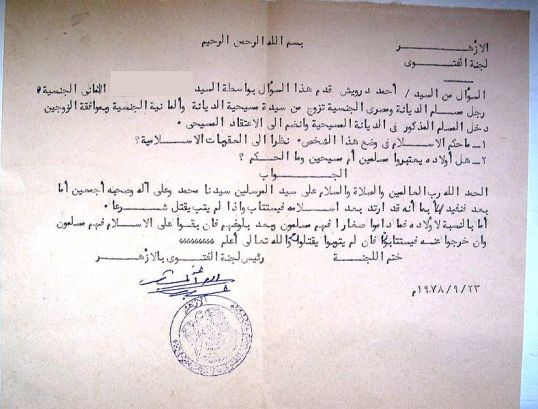La Shariah en el mundo – The Shariah in the world
Conforme con lo expuesto en nuestro artículo anterior y para poder construirnos una opinión basada en datos comprobables, a continuación examinaremos qué es la Shariah, en qué consiste, cuál es su posición con relación a la libertad individual de considerarse asimismo como musulmán o la burla de lo que se contempla como sagrado. La Sharia es el código moral y leyes religiosas del Islam. Esta trata diversos temas por lo general abordados en la ley secular: delincuencia, política, economía, herencia, etc. También incluye cuestiones personales, por ejemplo: apostasía, relaciones sexuales y preferencias, higiene, dieta, oración, ayuno, etc. En la mayoría de los países musulmanes ésta es considerada como la Ley Infalible de Dios – a diferencia de la interpretación humana de la ley (fiqh).
Hay dos fuentes principales que componen la Shariah: los preceptos establecidos en el Corán y el ejemplo marcado por el Profeta Muhammad en su Sunna, la cual está registrada en los Hadices (dichos, actos, aprobaciones o críticas atribuidas tanto válida o inválidamente al Profeta Mahoma). Donde ésta tenga un status oficial, la Shariah es interpretada por jueces islámicos (Qadis). Sobre interrogantes que no son directamente tratadas en las fuentes ya mencionadas, su aplicación se extiende a través de un consenso de los eruditos religiosos (Ulemas), quienes representan la comunidad musulmana (Ijma).
La apostasía es definida en La Shariah con una lista de acciones tales como: conversión a otra religión, negar la existencia de Dios, rechazar los profetas, burlarse de Dios o de sus profetas, adorar ídolos, rechazar la misma Shariah o declarar como permisivos comportamientos que son prohibidos por esta ley, tales como la fornicación, adulterio, homosexualidad, etc. De acuerdo a la mayoría de los eruditos musulmanes, la pena a pagar debe ser la muerte o aprisionamiento, a menos que la persona se arrepienta o se confirme que el acusado al momento de expresarse como apostata, éste(a) había estado padeciendo de algún desorden mental.
A continuación presentamos el siguiente documento emitido por el Comité de Fatwas de la Universidad del Cairo, la cual es una de las más altas instituciones islámicas en el mundo, concerniente al caso de un hombre en particular quien se había convertido al Cristianismo: “Debido a que el dejó el Islam, será invitado a expresar su arrepentimiento. Si él no lo hace, será asesinado de acuerdo a los derechos y obligaciones de la ley islámica.” La Fatwa (veredicto) también menciona que lo mismo será aplicado a sus hijos después que éstos alcancen la mayoría de edad:
Algunos eruditos en el Islam consideran que la pena de muerte solamente puede ser aplicada cuando la apostasía es acompañada con atentados que ponen en peligro la comunidad musulmana, rechazando así esa pena en otros casos. Entre los eruditos que sostienen esa teoría tenemos: Ahmad Shafaat, Jamal Badawi,Yusuf Estes, Javed Ahmad Ghamidi y el Jurista Maliki Abu al-Walid al-Baji.
Sin embargo, el famoso predicador hindú Dr. Zakir Naik señaló que si un ex-musulmán habla en contra del Islam, entonces eso es considerado como traición y debe ser castigado con la muerte en un país que sea gobernado bajo la Ley Islámica. También indicó que el no conoce ningún país que este regido 100% por la Shariah. Por otro lado, en el año 2011 dirigiéndose al Oxford Union, dijo que la pena de muerte no es un “castigo estándar” a aplicarse en caso de apostasía. La misma opinión también es sostenida por otros eruditos contemporáneos tales como Bilal Phillips.
El controversial teólogo islámico Yusuf al-Qaradawi, quien conduce el popular programa televisivo ash-Shariah wal-Hayat (“La Shariah y La Vida”) que se transmite a través de la cadena Al-Jazeera, sostiene que de acuerdo a Hadices (dichos o hechos atribuidos al Profeta Mahoma) y/o Fatwas (veredictos islámicos) emitidos por juristas anteriores, la pena con la que deben ser castigados los apóstatas es la muerte. La misma opinión es compartida por el conferencista islámico saudí Muhammad Saalih Al-Munajid, quien escribe y dirige el sito islámico en la web www.islam-qa.com y considera como necesario aplicar la pena de muerte sobre cada ex musulman, de otra manera, dejarlo vivo podría servir de incentivo para otros “buscar la verdad”.
ENGLISH
In accordance to what has been expressed in our previous article and to build us an opinion based on proven data, we shall then proceed to examine what Shariah is, what it involves, what is its position concerning the individual freedom to consider oneself as Muslim, or mocking on what is contemplated as sacred.
The Sharia is the moral code and religious law of Islam. It deals with many topics usually addressed by secular law: crime, politics, economics, inheritance, etc. Also it includes personal matters, for example: apostasy, sexual intercourse and preferences, hygiene, diet, prayer, fasting, etc. In the majority of muslim countries it is considered the Infallible Law of God — as opposed to the human interpretation of the law (fiqh).
There are two primary sources that make up the Shariah: the precepts set forth in the Qu´ran , and the example set by the Prophet Muhammad in his Sunnah which is recorded in the hadiths (sayings, acts, approvals, or criticism ascribed either validly or invalidly to the Prophet). Where it has official status, the Sharia is interpreted by Islamic judges (Qadis). For questions not directly addressed in the sources already mentioned, its application is extended through a consensus of religious scholars (Ulemas) whom represent the Muslim Community (Ijma).
Apostasy is defined in the Shariah with a list of actions such as conversion to another religion, denying the existence of God, rejection of the prophets, mocking God or his prophets, worshiping idols, reject the same Shariah, or declare as permitted some behaviors that are prohibited by this law, such as fornication, adultery, homosexuality, etc. According to the majority of muslim scholars, the penalty to be paid should be death or imprisonment, unless the person repents him or herself, or it was confirmed that the accused when expressed him or herself as apostate, he or she had been suffering from mental disorder.
We present the following document issued by the Fatwa Committee at Cairo University, which is one of the highest Islamic institutions in the world, concerning the case of a particular man who had converted to Christianity: “Because that he left Islam, he will be invited to express his regret. If he does not do it, he will be killed according to the rights and obligations of Islamic law.” The Fatwa (verdict) also mentions that the same will be applied to his children after they reach adulthood:
Some scholars of Islam believe that the death penalty can only be applied when apostasy is accompanied by acts which endanger the Muslim community, rejecting the death penalty in other cases. Among the scholars who hold this opinion are: Shafaat Ahmad, Jamal Badawi, Yusuf Estes, Javed Ahmad Ghamidi, and the maliki jurist Abu al-Walidal-Baji.
However, the famous muslim indian preacher Dr. Zakir Naik believes that if an ex-muslim speaks against Islam, then that is regarded as a treason and should be punished with death in a country that is governed under the Islamic Law. He also indicated that so far he does not know any country that is governed by the Shariah 100%. Morever, in 2011 while addressing the Oxford Union, he said that death penalty is not a “standard punishment” that should be applied in case of apostasy.
The controversial Islamic theologian Yusuf al-Qaradawi, who hosts the popular TV show Shariah wal-Hayat (“The Shariah and Life”) transmitted through the tv station l Al-Jazeera, says that according to the Hadiths (sayings or actions attributed to the Prophet Muhammad) and / or fatwas (Islamic rulings) issued by former jurists, the punishment that should be applied upon apostates is death. The same view is shared by the saudi Islamic lecturer Muhammad Saalih Al-Munajid, who writes and administrates the Islamic web site http://www.islam-qa.com, considers necessary to apply the death penalty on each ex-Muslim, otherwise , that would serve as an incentive for others to search “for the truth”.



